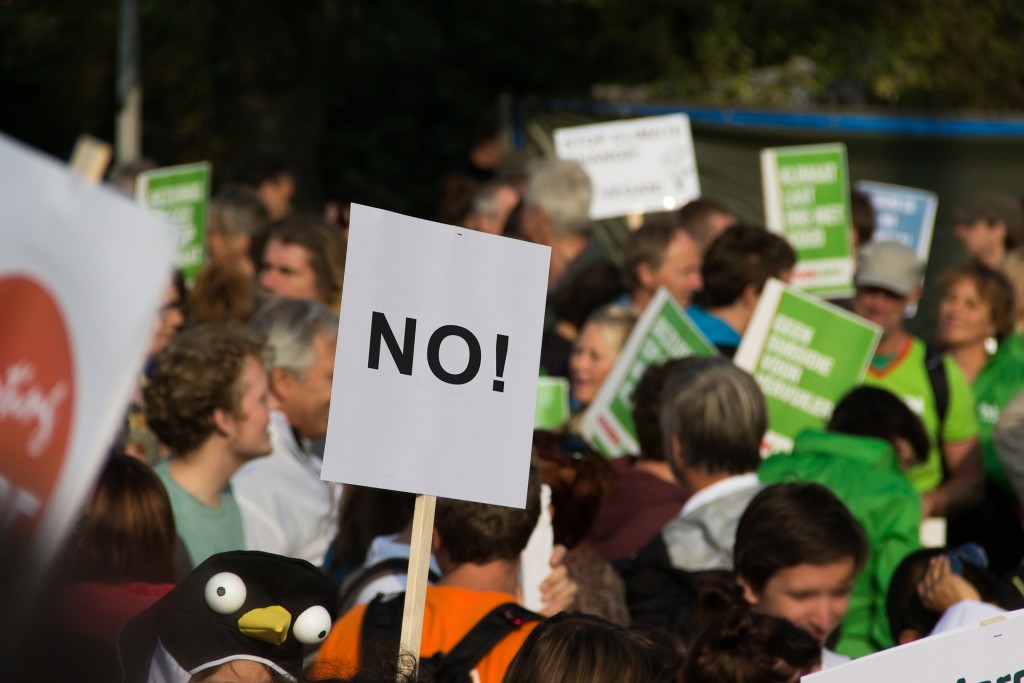Because it Matters: Getting Out of the Progressive Bubble
by Sam Pelletier
Much like finger-painting, politics is about enthusiasm. Campaigns live and die based on the conviction and dedication of supporters to their cause. Because of this, progressive bubble communities and friend groups develop a culture of activism that encourages participation and understands the merit of said participation as a given.
This can be a great thing, especially when the cause is positive, but if you’re in the bubble too long, it can be harder to relate to people who don’t do politics, and people who don’t do politics are a giant chunk of people.
Progressives are in a tough spot with this one, because it is true that non-voters tend to be more liberal. Someone, somehow found out that non-voters supported Obama 2 to1 over Romney. This leads to a persistent, celebrity infused, D.A.R.E.-program-like messaging onslaught from liberals about how important it is to vote and get involved.
Unlike the D.A.R.E. program, this has some merit to it. Voting is good. That concept can stand fine on its own. However, like the Dare Program, advocates have to ignore a lot of the real reason for the outreach.
When you’re in the game, you want to win, and it can be pretty transparent that that’s (mostly) why you’re out there trying to make sure that more people vote. The inspiring civic duty part of it is still there, but the main reason it’s being done is gamesmanship.
This is important to remember when you’re urging someone to vote for the first time. You’re doing it to serve your purpose, and if you conduct yourself like that’s not the case, that’s problematic.
People who “don’t like politics” don’t like hearing lines they’ve heard before, even if they’re true. This may very well be the “most important election in our lifetime” because of Trump’s loony toons proposals, but remember that 2012 was the most important election because of our fragile recovery, 2008 because of the recession, and 2004 because of the first time opportunity for giant-chinned Americans.
We say these things literally every time, because they work on some people, but they don’t work on the tuned out, the cynical, and those chronically suffering “voter apathy.”
Apathetic is a terrible term for non-voters. We’re talking about half the population here depending on the election. These folks volunteer at homeless shelters and coach little league teams. They adopt old dogs from the pound. They re-graffiti phallic images into wholesome, family friendly chickens. They care about a lot of things, just not your thing.
Don’t freak out, but many people view politics like sports and movies. There’s famous players, drama, and a lot of trivia that some know more than others, but no-one knows in entirety.
What’s crazy is that who wins in politics actually shapes economic and world affairs, and the trivia involved determines how it would be shaped. However, it’s not the only way to make the world better, and the attitude that activism always deserves a pat on the back isn’t helping.
Most activists and leaders I’ve met aren’t super into themselves, but there’s a strain of that running through the things we’re attempting to do. It goes with the territory when tasked with articulating why your interests and you’re actions make the world a better place. For the cynical American, it’s hard to hear a political message from someone and not assume there’s ego involved.
Nothing aforementioned is particularly useful. Doubt about whether a cause is just or correct is counterproductive to almost every single thing a campaign does. It kills the urgency. Also, reaching the cynical voter, like promoting a thrash metal band, is a lot of energy that may yield very little in results.
It’s way more productive in the short term to keep ramping up the excitement that generates donors, volunteers, and support from those who know they’re voting but aren’t sure who to vote for.
In the long term, there’s a huge swath of people who hate voting, hate political language, and are non-too fond of its messengers. A lot of activists, maybe most of them, downright can’t communicate with these people both because they’re trained to communicate in a way non-voters don’t respond to, and because doubtful and cynical perspectives are hard for activists to understand.
If that problem doesn’t get addressed in the long run, a lot of people will continue to stay home, and others will flock to today’s or tomorrow’s bigoted charlatan, because at the very least… He’s not a politician.
Sam Pelletier performs comedy throughout New England.








1 Comments
Francisco Pegueros
I would urge author Sam Pelletier and readers of West End News to acquaint themselves with the curriculums currently used by D.A.R.E.
In 2008, D.A.R.E. America formed an alliance with The Pennsylvania State University (PSU) for adoption of the keepin’ it REAL (kiR) curriculum as the D.A.R.E. middle school program. The kiR program as developed by PSU and Arizona State University, with support from the National Institute on Drug Abuse, through rigorous longitudinal scientific evaluation, kiR has been established as an evidence-based program (http://legacy.nreppadmin.net/ViewIntervention.aspx?id=133). Among other positive outcomes, studies have evidenced students completing the kiR program demonstrate:
• 32%-44% reduction in marijuana, tobacco, and alcohol use
• 30%-38% increase in knowledge about and negative attitudes towards
drug use
• 29%-34% decrease in intent to accept offers to use substances
I also refer readers to a Scientific American article The New D.A.R.E. Program—This One Works The “keepin’ it REAL” substance-abuse curriculum focuses on elementary and middle-school students’ decisions, not drugs (http://www.scientificamerican.com/article/the-new-d-a-r-e-program-this-one-works/). The article presents relevant and accurate information about the D.A.R.E. kiR curricula.